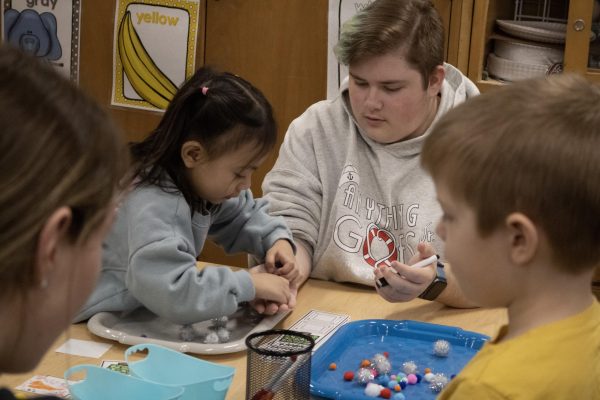The Culture of Team Intoxication
March 18, 2022
In this article, please read cautiously as The Oracle describes the effects of students consuming illegal substances: recreational drugs and alcoholic beverages.
As senior Harper Jennings* walked down the carpeted stairs of her teammate’s basement, Solo Cups were strewn about, and open cans of alcoholic seltzers sat on the floor. She stared in the direction of her teammates as laughter roared over the blasting music, and ping pong balls flew into cups filled with an alcoholic liquid as her team played beer pong. The energizing atmosphere sent chills down her arms as she walked around the room with an unwanted red cup from which she would never drink.
Jenning’s first experience around alcohol and drugs with her team was surprising and strange, she explained, as she had never been on a team where being under the influence was a bonding experience. Although Jennings does not drink and is a designated driver for her friends, she said she has seen the emphasis placed on alcohol at team parties.
“I remember the first party for [my] sport that I went to,” Jennings said. “Almost everyone there besides me was drinking, and while I didn’t really feel a ton of pressure, seeing everyone around me doing it made me feel almost a little bit like an outsider.”
The National Institute on Drug Abuse reported a culture surrounding alcohol and drugs amongst athletic teams involving both drinking and drug use amongst teammates. A study reported from the National Institute on Drug Abuse showed that 57 percent of high school athletes reported drinking alcohol, 25 to 29 percent reported smoking cigarettes, and 15 to 17 percent reported marajuana use. Meanwhile, 45 percent of non athletes reported drinking alcohol, 38 percent reported smoking cigarettes, and 23 percent reported marajuana use.
Junior Aubrey Prescott*, another South athlete, began drinking on occasion after she was introduced to alcohol by her teammates at an off-campus party, where many attendees partook in the illicit substance. Without much hesitation, she joined in.
“I think there is an unspoken pressure to get involved with drugs and alcohol on my team,” Prescott said. “Especially at parties, being surrounded by this environment can lead to people getting involved with this behavior. At [an] event the usage of these products appeared relatively normal, and I did not contemplate much before partaking.”
When an athlete chooses to get involved with alcohol and substance use, there can be serious consequences for violating South’s Code of Conduct, which strongly discourages attending parties or gatherings where illegal substances are present, Tom Mietus Assistant Principal of Athletics said.
If a student-athlete was caught violating the Code of Conduct, the player would be suspended from 10-20 percent of games depending on what substance they were caught using. For this to actually occur, there needs to be reasonable proof of said athlete getting involved with illegal substances.
“[Suspension] doesn’t mean they can’t come to practice [and] it doesn’t mean they can’t come to the game,” Mietus said.
However, Mietus acknowledged the struggle students may face when making good decisions, emphasizing students’ safety and security over everything.
“I remember being a student and I didn’t [always] make the best decisions,” Mietus said. “I hate having to give Code of Conducts, it hurts me. It hurts to take away something from student athletes, but at the same time, they’re there to protect the kids.”
South’s Code of Conduct states that there is no differentiation of consequences for in-season or out-of-season participation and an infraction can travel between years as well. For athletes, the Code of Conduct also addresses that if a student voluntarily discloses a violation – the offense still counts though a reduced penalty may be offered. As far as reporting different violations, the Code of Conduct asserts that they are assessed by the Director of Athletics and Student Activities.
Junior Teighan Harris is a part of South’s student to student program. Harris explained that this is a place for people who are trying to abstain from substance use without judgment. When experiencing peer pressure Harris acknowledged the importance of thinking about the future.
“Always consider the consequences,” Harris said. “Not just punishment-wise but what it could do to hurt your body.”
Dean Ashly Song hopes all students can reject the pressure from their peers; however, she noted that in our society some cases of peer pressure can be unavoidable.
“I know that a lot of students come across situations [involving peer pressure],” Song said. “My only hope is that when you’re in that situation, you have enough knowledge and support to make the best healthy decision.”
Still, Song emphasized that she wants students to be aware of the consequences to their actions, especially if a student is in the midst of playing on a school sports team.
“[I’d encourage that student] to stop,” Song said. “Especially if you’re an athlete, because of all the health concerns that come with it. But also, that could very much impact one’s life, school life, after school life, so just being able to help that student maintain a positive school life I would try to find ways to support them [make better decisions].”
Although Prescott believes that alcohol and drug use are unhealthy, she said partaking in these activities did not stop the girls from forming genuine connections and continuing to grow a close knit bond.
“It is not a positive thing to be involved with alcohol or drugs,” Prescott said. “Nevertheless, it has led me to a group that I am similar to and confide deeply in.”
While consuming alcohol at past sports parties, Prescott said it has only increased her participation in drinking, and has also impacted her friendships outside of her team.
“[Drinking] has definitely cost me the relationships of some friends,” Prescott said. “My friend group shifted completely once I got involved. It has shaped the nature of my high school experience as my life would be much different without usage of these products.”
Senior Jacob Caddel* has found that consumption of alcohol and other substances are not beneficial for his physical health during his sports season. During Caddel’s season, teammates divide into separate groups based on similar values.
“There are cliques [on my team],” Caddel said. “Even if you do use alcohol, it does not matter. Some people just want to invite you to something, and that’s why everyone has their own group within each team.”
Harris said she joined student to student to hold herself accountable, and encourage herself to lead a healthy lifestyle. She vocalized how as an athlete drinking prevents anyone from being their most successful self.
“I think students should join student to student to encourage themselves to be better,” Harris said. “It’s a great club for student athletes as well as other students just looking to remain substance free.”
*Names have been changed














